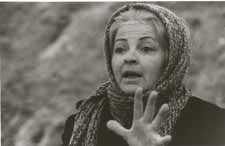Budapest Tales

Budapest Tales is an event that took place on 27-Nov-2000 in Hyderabad.
-
Venue
-
Date/Time
-
Type
-
Price
-
Venue Website
-
Add New Field:
REVIEW FOR BUDAPEST TALES
(Hungary /1976/Col/91min)
Director: Istvan Szabo
Music: Zdenko Tamassy
During the immediate post-war period, a handful of homeless persons stumble upon a tramcar that has been washed up on a sandy river bank. The refugees, who are heading towards Budapest, decide to put the car on its wheels, set it on the rails, and continue their journey in it. After much painstaking effort, they get the car on to the track, and loading their belongings and themselves onto it, they continue their journey in it.
On the way, they come across an abandoned warehouse where they find sacks of foodstuffs - a real windfall. They load the lot into the car and on they move. The car now represents real value, something they will want to cling to, fight for a defend. Other hordes of refugees trudging their way through the woods, the rigors of weather and the lack of comforts and conveniences, with differences and quarrels amongst themselves, add to the difficulties of the trek, which is becoming an increasingly arduous and formidable undertaking.
The group's progress is marked by countless quarrels and clashes. They bury their dead, new loves and friendships spring up, and some give up not able to withstand the countless hardships. A few die of the formidable effort and there are some who lay down their lives for the community.
But the group never gives up. Newer ideas and renewed effort coupled with great courage keep their hopes and strength alive, dispel doubts, and win over the onlookers by the roadside so that the tramcar may keep moving along towards its destination, so that they can negotiate each new crossing and each new obstacle. One misty morning they are joined by dozens of other tramcars, with people like themselves, all of them heading towards the same destination.
The film is an allegory of Hungarian history since the war, with its brave ideals, its setbacks and frustrations, and its need for solidarity and cohesion if the goal is to be attained.
USER REVIEWS FOR BUDAPEST TALES
Be the first to comment on Budapest Tales! Just use the simple form below.
LEAVE A COMMENT
fullhyd.com has 700,000+ monthly visits. Tell Hyderabad what you feel about Budapest Tales!
MORE EVENTS IN THIS PERIOD
ALL EVENT CATEGORIES
SEARCH EVENTS
Dissatisfied with the results? Report a problem or error, or add a listing.
ADVERTISEMENT
SHOUTBOX!
{{ todo.summary }}... expand »
{{ todo.text }}
« collapse
First | Prev |
1 2 3
{{current_page-1}} {{current_page}} {{current_page+1}}
{{last_page-2}} {{last_page-1}} {{last_page}}
| Next | Last
{{todos[0].name}}
{{todos[0].text}}
ADVERTISEMENT
This page was tagged for
Sarathi Studio events
November 2000 events
hyderabad arts
hyderabad movies / film